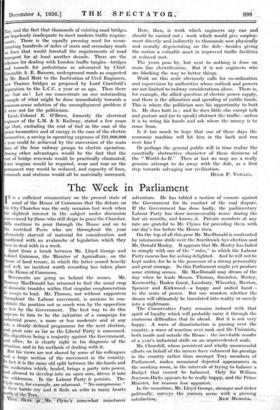The Week in Parliament
T is a sufficient Commentary on the present state of mind of the House of Commons that the debate on he City Churches was the only occasion last week when he slightest interest in the subject under discussion vas evinced by those who still deign to grace the Chamber. lls continue to pour through the House and on to he wretched Peers who are throughout the year Iternately starved of -material for consideration and mothered with an avalanche of legislation which they lave to deal with in a week.
Apart from a brush between Mr. Lloyd George and olonel Guinness, the Minister of Agriculture, on the hone of land tenure, in which the latter .scored heavily nd well, no incident worth recording has taken place n the House of Comnions.
Movements are going on behind the scenes. Mr. amsay MacDonald has returned to find the usual crop • f domestic troubles within that singular conglomeration e essays to lead. Mr. Thomas, not without supporters hroughout the Labour movement, is anxious to con- solidate the position not so much won by the opposition s lost by the Government. The best way to do this PPears to him to be the initiation of a campaign for ndustrial peace, a more or less moderate and at any ate a clearly defined programme for the next election, nd great care as far as the Liberal Party is concerned. its objectives being a'majority against the Government,. nd office, he is clearly right in his diagnosis of the ituation, and in his methods of dealing with it. But his views are not shared by some of his colleagues nd a large section of the movement in the 'Country. n fact it is the same old split between the die-hards and he moderates - which, healed, brings a party into power, nd allowed to develop into an open sore, drives it into he wilderness. In the Labour Party it persists. The I3-de men, for- example, are adamant. " No compromise " s their battle cry and it finds an echo in many hearts orth of the Tees.
hen there is Mr. Clyne's somewhat inipetuoiii adventure. He has tabled a motion of censure against the Government for its conduct of the coal dispute. If the Government has done badly, the parlimentary Labour Party has done inconceivably worse during the last six months, and knows. it. Private members at any rate are grateful to Mr. Clynes for providing them with one day's fun before the House rises.
On the top of all this poor Mr: MacDonald is confronted by internecine strife over the Smethwick bye-election and Mr. Oswald Mosley. It appears that Mr. Mosley has failed to comply with one of the " rules," in which the Labour Party caucus has for so long delighted. And he will not be kept under, for he is the possessor of a strong personality and great courage. So this Parliament might yet produce some stirring scenes. Mr. MacDonald may dream of the day when he leads Messrs. Thomas, Snowden, Mosley, Kenworthy, Haden Guest, Lansbury, Wheatley, Maxton, Spencer and Kirkwood—a happy and united band— to the seats of pOwer. But one wonders whether the dream will ultimately be translated into reality or merely into a nightmare. The Conservative Party remains imbued with that spirit of loyalty which will probably carry it through the enormous difficulties that lie ahead. But it is not very happy. A wave of dissatisfaction is passing over the country, a wave of reaction over rank and file Unionists, both inside and outside the House : the inevitable results of a year's industrial strife on an unprecedented scale.
Mr. Churchill, whose persistent and wholly unsuccessful efforts on behalf of the miners have enhanced his prestige in the country rather than amongst Tory members of Parliament, makes occasional dejected appearances in the smoking room, in the intervals of trying to balance a Budget that 'cannot be balanced. Only Sir William Joynson-Hicks appe- to be really happy, and the Prime Minister, for reasons' less apparent. - In the meantime, Mr. Lloyd George, stronger and richer politically, surveys the curious scene with" a growing






























































 Previous page
Previous page